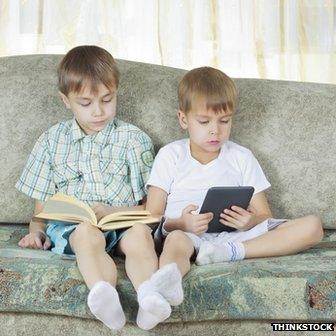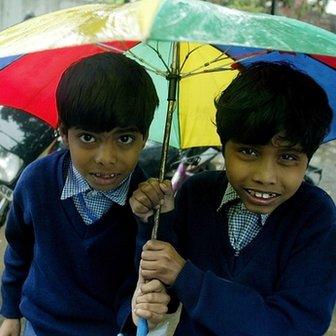Do smart devices make smart kids?
- Published
- comments
WATCH: Mindshapes' CEO David Begg explains how interactive online books are made
I grew up with Ladybird books. They looked pretty old-fashioned when I was reading them and they seem to belong to a bygone age in the era of iPads and e-books.
These days, with the toddler acknowledged as the family's tablet expert, children often learn to navigate the internet before they learn to read.
But are smart screens making our children smarter or simply creating a new generation of "square eyes"?
In the US most young children have access to a touch-screen device and, according to Daniel Anderson, a professor emeritus of psychology at the University of Massachusetts, using these devices could be more addictive than watching television.
A young child will look away from a TV screen about 150 times an hour, but a well-designed iPad app is more engaging because the child is touching the screen to generate actions.
Reading crisis

Book or e-book reader? Which is best?
Half of all US 10-year-olds read poorly, according to Dr Michael Levine, executive director of the Joan Ganz Cooney Center, which was set up to research how digital media impact on learning.
One of the centre's studies, using an iPod Touch, found that the vocabulary of 13 five-year-olds improved by an average of 27% after using an educational app called Martha Speaks.
Another study, using a different educational app, had a similar result, with three-year-olds showing a 17% gain.
Its latest research compared how children learned using traditional books versus e-readers.
The conclusion was that for young children traditional books were more effective in focusing attention on literacy skills while e-readers helped older children maintain attention and excitement with books.
But even then the picture is complicated.
"Children may be distracted by the bells and whistles of enhanced e-books. They may be engaged but many are not comprehending as much," said Dr Levine.
"It depends on the context and content, but e-readers aren't going to solve the reading crisis."
Book power
The idea that apps and touch screens are now constant companions for young readers was the inspiration for MagicTown, a fantasy world built around classic children's books such as Elmer, Winnie The Witch and Little Princess.
The site is trying to bridge the gap between the screen-based digital world and a time when families gathered around to listen to stories.
Every time a child listens to a story, they create a new house in the town.
They can choose a variety of modes for stories, from basic listening to modules that require them to participate in the story.
Even in the web age, stories maintain their power said David Begg, chief executive officer and co-founder.
"Story is the best medium to teach children. From the village elder importing stories from generation to generation, it is how people learn about emotions, morals and the structure of society," he said.
In Magic Town the village elder is a lion called Louis who will tell different stories to children daily.
The tree at the centre of the town grows more leaves the more stories listened to and withers if none are read.
"It is not about ramming books down kids throats but about engaging them," said Mr Begg.
"We wanted it to be something that parents think is valuable for their children," he added.
Screen learning

Not all children have access to books at home
The model of children learning alongside adults is thought to be the ideal, but in parts of the world with low literacy rates it is simply not possible.
In such places, the screen may take the place of a parent or teacher.
Prof Sugata Mitra, whose "hole-in-the-wall" terminals offered children living in the slums of India their first experience of computers.
Now, in conjunction with the Massachusetts Institute of Education, he is experimenting with teaching children to read without adult intervention.
"We are trying to find out if children can learn to read by themselves," he said.
He and his team have created reading software which has been installed on computers in three villages in central India, one in West Bengal, plus in a slum school and household in Calcutta.
The trial runs until the end of the year.
"The field reports so far are exciting. Children are starting to read already," said Prof Mitra.
Just how technology can be harnessed to help children learn in better ways may be unclear, but it is obvious children's perception of books has radically altered.
"Really young children look at a real book and think that it is electronic. They try to swipe it and think it is broken when nothing happens," said Dr Levine.